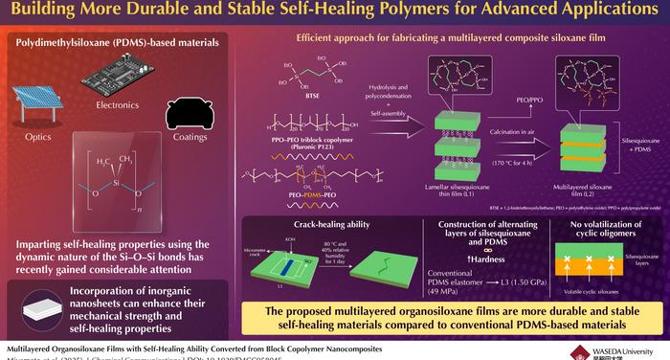Bioengineer
1d
241

Image Credit: Bioengineer
Breakthrough in Self-Healing Materials: Streamlined Self-Assembly Process Revealed
- Researchers at Waseda University have developed a groundbreaking self-healing film using organosiloxane and polydimethylsiloxane (PDMS) through a multilayered approach.
- The self-assembly process yielded films with improved rigidity and stability compared to traditional PDMS materials, integrating organosiloxane and PDMS layers.
- Introduction of Si-O⁻ groups in the films facilitated self-healing mechanisms, enabling recovery from micrometer-scale cracks after exposure to harsh conditions.
- The self-healing film exhibited impressive hardness of 1.50 GPa, surpassing conventional PDMS elastomers and offering enhanced durability for various applications.
- The multilayered design reduces susceptibility to wear, leading to decreased maintenance and replacements, promoting sustainability in material applications.
- Additionally, the films demonstrate improved thermal resistance, benefiting applications in flexible electronics and consumer electronics.
- The development aligns with the global shift towards greener and more sustainable materials, addressing challenges faced by modern industries.
- The self-healing technology presents opportunities for advanced materials that can self-repair, potentially revolutionizing industry standards.
- The research emphasizes the significance of self-healing materials for maintenance-free and durable applications, driving the conversation around sustainable engineering practices.
- Waseda University's advancement in self-healing film technology could have far-reaching implications on the materials science landscape and inspire further studies in the field.
Read Full Article
14 Likes
For uninterrupted reading, download the app